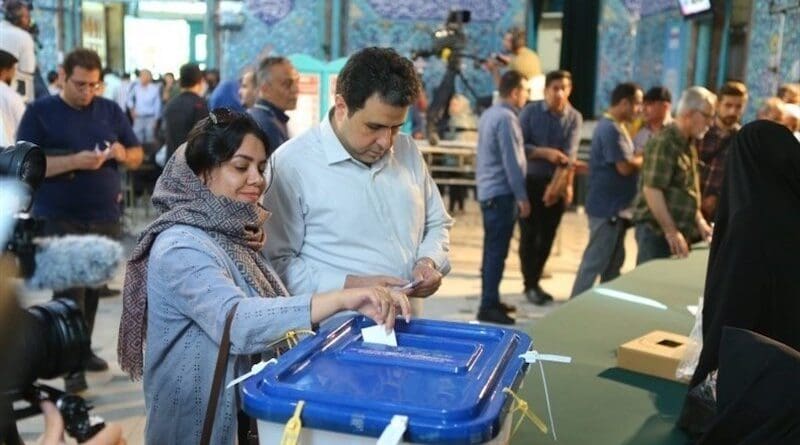Iranians Await Results In Snap Presidential Vote Amid Mounting Anger Over Policies
By RFE RL
(RFE/RL) — Iranians await results on June 29 from a snap presidential election triggered by the death of Ebrahim Raisi in a helicopter crash.
An estimated 61 million voters were eligible to take part in the voting held on June 28 at a time of growing frustration over a lack of freedoms, declining living standards, and a faltering economy.
Balloting was extended several times before finally ending at midnight in Tehran with officials saying counting had begun with results to be announced through the day on June 29.
Balloting appeared to go smoothly with few disruptions, though the official IRNA news agency reported early on June 29 that unidentified gunmen attacked a vehicle carrying election boxes in Iran’s Sistan-Baluchistan province, killed two security force members and injuring several others.
All four candidates vying for the post were vetted and approved by the Guardians Council, an unelected constitutional watchdog whose members are directly and indirectly appointed by Supreme Leader Ayatollah Ali Khamenei.
The outcome of the election is unlikely to result in major policy shifts, but it could have an impact on the succession to the 85-year-old Khamenei, who has been Iran’s supreme leader since 1989.
No candidate is expected to secure a majority in the first round amid reports of sluggish voter turnout. A runoff between the top two vote-getters has been scheduled for July 5.
The election appeared to be a three-way race between conservative Parliament Speaker Mohammad Baqer Qalibaf, hard-line former nuclear negotiator Saeed Jalili, and reformist lawmaker Masud Pezeshkian.
Last-ditch efforts to rally behind a consensus conservatives candidate failed on the eve of the election, with neither Qalibaf nor Jalili willing to drop out in favor of the other.
Conservatives have expressed concern that the lack of unity could split the vote to the benefit of reformist Pezeshkian.
Qalibaf is a former commander of the Islamic Revolutionary Guards Corps (IRGC) Air Force and is the longest-serving mayor of Tehran.
He is a traditional conservative who ran for president for the fourth time in the past 20 years. Qalibaf has faced many corruption allegations throughout his career, though none has dented his relationship with Khamenei.
Jalili, who has never held elected office, serves as Khamenei’s personal representative on the Supreme National Security Council (SNSC). During his 2007-13 term as SNSC’s secretary he led the Iranian delegation in failed talks with the West on Tehran’s nuclear program.
Pezeshkian has been a member of parliament since 2008 and served as deputy speaker from 2016 to 2020, when moderates and reformists had a majority in the legislature.
He has questioned Iran’s methods of enforcing the hijab, the Islamic head scarf for women, and spoken in favor of negotiating with the West. But he has said he will follow Khamenei’s policies if elected.
The fourth candidate is cleric Mostafa Pourmohammadi.
Opinion polls projected a slightly higher voter participation than in the last presidential election in 2021, which saw a record-low turnout of just under 49 percent. Critics say the real number was likely even lower.
The Iranian Interior Ministry extended the voting period three times on June 28, first to 8 p.m., then to 10 p.m., and finally until midnight.
Khamenei encouraged Iranians to vote as he cast his ballot shortly after the polls opened.
“We encourage our dear people to take the issue of voting seriously and participate,” he said.
Dissidents at home and abroad called for a boycott, arguing that voting in past elections has failed to deliver change.
The political establishment has long maintained it derives its legitimacy from strong voter turnout, but poor participation in recent elections and deadly protests against the Islamic republic have challenged the legitimacy of the current leadership.
In Iran, the supreme leader has the final say on all state matters and the president does not have much sway on many key issues.
Raisi, who many Iranians refer to as the Butcher of Tehran for his alleged role in the mass execution of political prisoners in 1988 when he was Tehran’s deputy prosecutor, died along with Foreign Minister Hossein Amir-Abdollahian and several other officials when their helicopter crashed on May 19.
With reporting by Hannah Kaviani of RFE/RL’s Radio Farda

